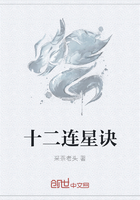was after him. I saw him turn his face over his shoulder, and then bustle on faster. Neither of us, pursued or pursuer, dared quite to run; as it was, our eager strides and our carelessness of collisions created more than enough attention. But I had one advantage. Most folk in Strelsau knew me, and many got out of my way who were by no means inclined to pay a like civility to Bauer. Thus I began to gain on him, in spite of his haste; I had started fifty yards behind, but as we neared the end of the street and saw the station ahead of us, not more than twenty separated me from him. Then an annoying thing happened. I ran full into a stout old gentleman; Bauer had run into him before, and he was standing, as people will, staring in resentful astonishment at his first assailant's retreating figure. The second collision immensely increased his vexation; for me it had yet worse consequences; for when I disentangled myself, Bauer was gone! There was not a sign of him; I looked up: the number of the house above me was twenty-three; but the door was shut. I walked on a few paces, past twenty-two, past twenty-one--and up to nineteen. Nineteen was an old house, with a dirty, dilapidated front and an air almost dissipated. It was a shop where provisions of the cheaper sort were on view in the window, things that one has never eaten but has heard of people eating. The shop-door stood open, but there was nothing to connect Bauer with the house. Muttering an oath in my exasperation, I was about to pass on, when an old woman put her head out of the door and looked round. I was full in front of her. I am sure that the old woman started slightly, and I think that I did. For I knew her and she knew me. She was old Mother Holf, one of whose sons, Johann, had betrayed to us the secret of the dungeon at Zenda, while the other had died by Mr. Rassendyll's hand by the side of the great pipe that masked the king's window. Her presence might mean nothing, yet it seemed at once to connect the house with the secret of the past and the crisis of the present.
She recovered herself in a moment, and curtseyed to me.
"Ah, Mother Holf," said I, "how long is it since you set up shop in Strelsau?"
"About six months, my lord," she answered, with a composed air and arms akimbo.
"I have not come across you before," said I, looking keenly at her.
"Such a poor little shop as mine would not be likely to secure your lordship's patronage," she answered, in a humility that seemed only half genuine.
I looked up at the windows. They were all closed and had their wooden lattices shut. The house was devoid of any signs of life.
"You've a good house here, mother, though it wants a splash of paint," said I. "Do you live all alone in it with your daughter?"
For Max was dead and Johann abroad, and the old woman had, as far as I knew, no other children.
"Sometimes; sometimes not," said she. "I let lodgings to single men when I can."
"Full now?"
"Not a soul, worse luck, my lord." Then I shot an arrow at a venture.
"The man who came in just now, then, was he only a customer?"
"I wish a customer had come in, but there has been nobody," she replied in surprised tones.
I looked full in her eyes; she met mine with a blinking imperturbability. There is no face so inscrutable as a clever old woman's when she is on her guard. And her fat body barred the entrance; I could not so much as see inside, while the window, choked full with pigs' trotters and such-like dainties, helped me very little. If the fox were there, he had got to earth and I
could not dig him out.
At this moment I saw James approaching hurriedly. He was looking up the street, no doubt seeking my carriage and chafing at its delay. An instant later he saw me.
"My lord," he said, "your train will be ready in five minutes; if it doesn't start then, the line must be closed for another half-hour."
I perceived a faint smile on the old woman's face. I was sure then that I was on the track of Bauer, and probably of more than Bauer. But my first duty was to obey orders and get to Zenda.
Besides, I could not force my way in, there in open daylight, without a scandal that would have set all the long ears in Strelsau aprick. I turned away reluctantly. I did not even know for certain that Bauer was within, and thus had no information of value to carry with me.
"If your lordship would kindly recommend me--" said the old hag.
"Yes, I'll recommend you," said I. "I'll recommend you to be careful whom you take for lodgers. There are queer fish about, mother."
"I take the money beforehand," she retorted with a grin; and I
was as sure that she was in the plot as of my own existence.
There was nothing to be done; James's face urged me towards the station. I turned away. But at this instant a loud, merry laugh sounded from inside the house. I started, and this time violently. The old woman's brow contracted in a frown, and her lips twitched for a moment; then her face regained its composure;
but I knew the laugh, and she must have guessed that I knew it.
Instantly I tried to appear as though I had noticed nothing. I
nodded to her carelessly, and bidding James follow me, set out for the station. But as we reached the platform, I laid my hand on his shoulder, saying:
"The Count of Hentzau is in that house, James."
He looked at me without surprise; he was as hard to stir to wonder as old Sapt himself.
"Indeed, sir. Shall I stay and watch?"
"No, come with me," I answered. To tell the truth, I thought that to leave him alone in Strelsau to watch that house was in all likelihood to sign his death warrant, and I shrank from imposing the duty on him. Rudolf might send him if he would; I dared not.
So we got into our train, and I suppose that my coachman, when he had looked long enough for me, went home. I forgot to ask him afterwards. Very likely he thought it a fine joke to see his master hunting a truant servant and a truant bag through the streets in broad daylight. Had he known the truth, he would have been as interested, though, maybe, less amused.














